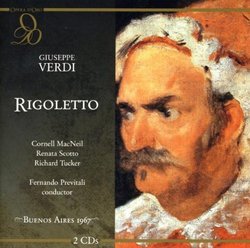| All Artists: Giuseppe Verdi, Fernando Previtali, Colon Theater Orchestra (Buenos Aires), Argentina Orchestra of Teatro Colón, Carmen de la Mata, Cornell MacNeil, Giulio Gagliardo, Guerrino Boschetti, Martha Carrizo, Noemi Souza, Orazio Mastrango, Renata Scotto, Ricardo Yost, Richard Tucker, Stella Maris Silva, Victor de Narke, William Wildermann Title: Verdi: Rigoletto Members Wishing: 1 Total Copies: 0 Label: Opera D'oro Original Release Date: 1/1/2006 Re-Release Date: 10/10/2006 Genre: Classical Style: Opera & Classical Vocal Number of Discs: 1 SwapaCD Credits: 1 UPC: 723721242152 |
Search - Giuseppe Verdi, Fernando Previtali, Colon Theater Orchestra (Buenos Aires) :: Verdi: Rigoletto
 | Giuseppe Verdi, Fernando Previtali, Colon Theater Orchestra (Buenos Aires) Verdi: Rigoletto Genre: Classical
"MacNeil was one of the last of the true dramatic Verdi baritones, and the end of his career left a void that is still unfilled." -- ALL MUSIC GUIDE — Live performance, Buenos Aires, August 22, 1967. Although many of Ver... more » |
Larger Image |
CD Details
Synopsis
Album Description
"MacNeil was one of the last of the true dramatic Verdi baritones, and the end of his career left a void that is still unfilled." -- ALL MUSIC GUIDE
Live performance, Buenos Aires, August 22, 1967. Although many of Verdi's nearly thirty operas remain popular, Rigoletto, his seventeenth, is among the most beloved. Though its story is grim, and even gruesome at the end, its music is so memorable, so dramatically powerful, that it sweeps the listener along with it. This exciting live performance features some of the finest singers of its era, including Renata Scotto, one of the great Italian singers of her generation, and beloved American tenor Richard Tucker. Cast in the title role is a baritone who was once a well-known name on the operatic scene, and one of the most famous Rigolettos, but who is curiously forgotten by many today. Born in Minneapolis in 1922, Cornell MacNeill began his career singing Broadway musicals, but turned to opera with the New York City Opera in 1953. His Metropolitan Opera debut took place in 1969 as Rigoletto. Over the years he would sing twenty-six different roles at the Met, in over five hundred performances. Although not considered a great actor, MacNeil had a sonorous, rolling baritone that thrilled audiences with the splendor of its ring. He was especially admired in the major Verdi roles, but he also triumphed in verismo parts such as Michele in Puccini's Il Tabarro and Gianciotto in Zandonai's Francesca da Rimini, the latter televised to a worldwide audience. In addition to his stage career, MacNeil served as president of the American Guild of Musical Artists beginning in 1969.
Live performance, Buenos Aires, August 22, 1967. Although many of Verdi's nearly thirty operas remain popular, Rigoletto, his seventeenth, is among the most beloved. Though its story is grim, and even gruesome at the end, its music is so memorable, so dramatically powerful, that it sweeps the listener along with it. This exciting live performance features some of the finest singers of its era, including Renata Scotto, one of the great Italian singers of her generation, and beloved American tenor Richard Tucker. Cast in the title role is a baritone who was once a well-known name on the operatic scene, and one of the most famous Rigolettos, but who is curiously forgotten by many today. Born in Minneapolis in 1922, Cornell MacNeill began his career singing Broadway musicals, but turned to opera with the New York City Opera in 1953. His Metropolitan Opera debut took place in 1969 as Rigoletto. Over the years he would sing twenty-six different roles at the Met, in over five hundred performances. Although not considered a great actor, MacNeil had a sonorous, rolling baritone that thrilled audiences with the splendor of its ring. He was especially admired in the major Verdi roles, but he also triumphed in verismo parts such as Michele in Puccini's Il Tabarro and Gianciotto in Zandonai's Francesca da Rimini, the latter televised to a worldwide audience. In addition to his stage career, MacNeil served as president of the American Guild of Musical Artists beginning in 1969.

 Track Listings (16) - Disc #1
Track Listings (16) - Disc #1